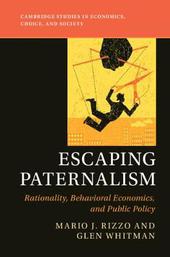
|
Escaping Paternalism: Rationality, Behavioral Economics, and Public Policy
Hardback
Main Details
| Title |
Escaping Paternalism: Rationality, Behavioral Economics, and Public Policy
|
| Authors and Contributors |
By (author) Mario J. Rizzo
|
|
By (author) Glen Whitman
|
| Series | Cambridge Studies in Economics, Choice, and Society |
|---|
| Physical Properties |
| Format:Hardback | | Pages:506 | | Dimensions(mm): Height 235,Width 157 |
|
| Category/Genre | Macroeconomics
Business and management |
|---|
| ISBN/Barcode |
9781107016941
|
| Classifications | Dewey:330.019 |
|---|
| Audience | | Professional & Vocational | |
|---|
| Illustrations |
Worked examples or Exercises; 3 Line drawings, black and white
|
|
Publishing Details |
| Publisher |
Cambridge University Press
|
| Imprint |
Cambridge University Press
|
| Publication Date |
5 December 2019 |
| Publication Country |
United Kingdom
|
Description
The burgeoning field of behavioral economics has produced a new set of justifications for paternalism. This book challenges behavioral paternalism on multiple levels, from the abstract and conceptual to the pragmatic and applied. Behavioral paternalism relies on a needlessly restrictive definition of rational behavior. It neglects nonstandard preferences, experimentation, and self-discovery. It relies on behavioral research that is often incomplete and unreliable. It demands a level of knowledge from policymakers that they cannot reasonably obtain. It assumes a political process largely immune to the effects of ignorance, irrationality, and the influence of special interests and moralists. Overall, behavioral paternalism underestimates the capacity of people to solve their own problems, while overestimating the ability of experts and policymakers to design beneficial interventions. The authors argue instead for a more inclusive theory of rationality in economic policymaking.
Author Biography
Mario J. Rizzo is a professor of Economics, Director of the Foundations of the Market Economy Program, and Co-Director of the Classical Liberal Institute at New York University. He is the co-author of Austrian Economics Re-Examined: The Economics of Time and Ignorance (2014). He has published in such journals as Journal of Legal Studies, the Columbia Law Review and the UCLA Law Review. Glen Whitman is a professor of Economics at California State University, Northridge. He is the co-editor of Economics of the Undead: Zombies, Vampires, and the Dismal Science (2014). He has published in such journals as the UCLA Law Review, the Journal of Legal Studies, and the Journal of Economic Behavior and Organization.
Reviews'Taking issue with the narrow norms of rationality in much of behavioral economics, this remarkable book argues in favor of an inclusive concept of rationality and is one of the first to cover the full range of relevant empirical evidence from psychology. Escaping Paternalism promotes a serious attempt to understand why people do what they do.' Gerd Gigerenzer, Director of the Harding Center for Risk Literacy, Max-Planck-Institut fur Bildungsforschung, Berlin 'Mario J. Rizzo and Glen Whitman have written an incisive yet accessible critique of the dominant strain of behavioral economics associated with Daniel Kahneman, Richard Thaler and Cass Sunstein. Rizzo and Whitman are wise enough to know that human beings, with quirks and practices, are 'people, not puppets'. Yet they show how classical liberal principles of governance do far better in organizing social arrangements than the various forms of soft paternalism now in vogue with so many behavioral economists.' Richard Epstein, Laurence A. Tisch Professor of Law, New York University 'Mario J. Rizzo and Glen Whitman present a powerful and well-documented critique of behavioural economists' justifications of paternalism. They argue convincingly that these justifications illegitimately presuppose that rational-choice theory is a normative standard. Inspired by the psychology of Gerd Gigerenzer, they offer a more pragmatic and 'ecological' understanding of human rationality.' Robert Sugden, University of East Anglia
|